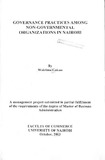| dc.contributor.author | Wairimu, Gakuo | |
| dc.date.accessioned | 2013-05-15T06:35:43Z | |
| dc.date.available | 2013-05-15T06:35:43Z | |
| dc.date.issued | 2003-10 | |
| dc.identifier.citation | Masters Of Business Administration (MBA) Degree, University of Nairobi | en |
| dc.identifier.uri | http://erepository.uonbi.ac.ke:8080/xmlui/handle/123456789/22787 | |
| dc.description | A management research project submitted in partial
fulfilment of the requirements for the Degree Of
Master of Business Administration (MBA), Faculty of
Commerce, University of Nairobi | en |
| dc.description.abstract | The interest in governance practices has increased over the last two decades an increasing
desire to make organizations more visibly accountable, not only to owners but also to
other stakeholder groups, including the community at large. Good governance leads to
efficient and effective use of limited resources. The role of the nonprofit organizations is
coming into the limelight as the public is now looking to the sector to address the social
problems that business and government have failed to solve. The fact that donors have
over the last two decades channeled a large amount of the resources through NGOs in
Kenya has given rise to concerns over the use of these resources.
This study was conducted with the objective of establishing the current governance
practices within the non-governmental sector in Kenya, with a special focus on NGOs
based in Nairobi. A cross sectional study was undertaken targeting fifty organizations
that were randomly selected for the study. However, only 32 organizations responded.
Primary data was collected using a self-administered questionnaire with both open-ended
and closed questions. The target respondents were the Chief Executive Officers of the
NGOs. A large amount of descriptive information was collected and analyzed using the
SPSS software and the information presented in the form of tables.
The study found that the NGOs have boards in place to support key roles such as policy
making and control of financial resources. Policies and guidelines also existed to guide
the operations of the boards. There was a distinction between the roles of management
and the boards in the organizations. The boards were found to be diverse in terms of
gender and skill representation. Very limited training was undertaken for the boards.
The balance of power between the three principle players in the governance triangle was
found to be skewed in favor of boards and management, leaving out the stakeholders who
include clients or community groups benefiting from the NGOs interventions.
Management was found to have a strong influence on decision making within the boards.
NGOs were also found to give more weight to their relationships with external
stakeholders such as government and donors. Though the NGOs stated that they were
satisfied with the governance practices in their organizations, there is need to address the
weaknesses identified. NGOs suggested that good governance could be strengthened
through improved communication and creation of stronger links with stakeholders. | en |
| dc.language.iso | en | en |
| dc.publisher | University of Nairobi | en |
| dc.title | Governance practices among Non-Governmental Organizations in Nairobi | en |
| dc.type | Thesis | en |
| local.publisher | School of Business | en |

